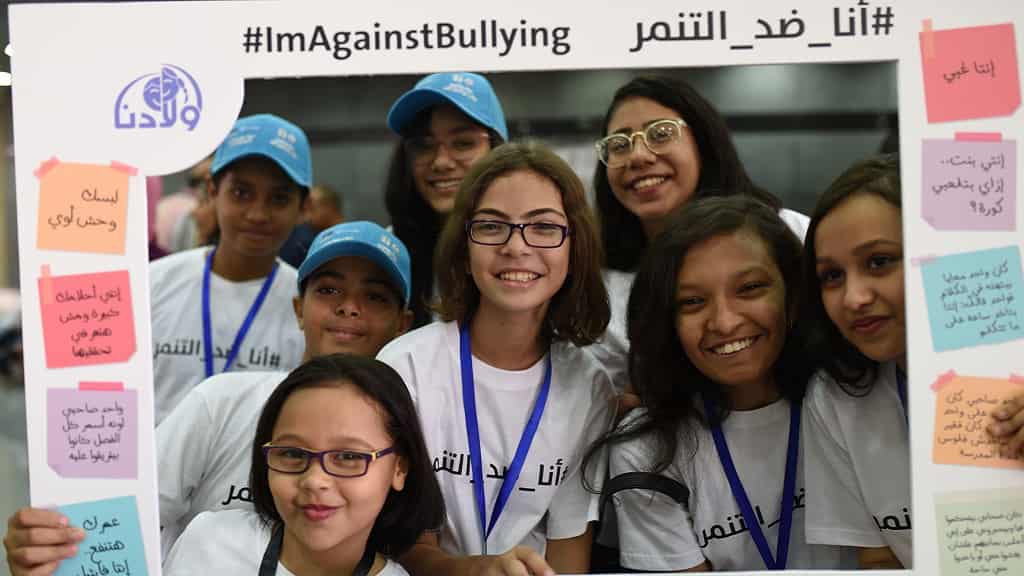Before It Ends… A brief look at the accomplishments of the #ImAgainstBullying campaign
Few weeks before the beginning of the school year, The United Nations Children’s Fund (UNICEF) in co-operation with the National Council for Childhood and Motherhood (NCCM) and in partnership with the Ministry of Education and Technical Education (MOETE), launched the first national campaign against school bullying.
School bullying is defined as an aggressive behavior directed deliberately by one or a group of students against another student repeatedly. It may include physical violence, such as kicking, hitting or hair ripping. It may just as well involve name-calling, isolation from the group or illegal uploading of edited pictures of the boy or girl to the social platforms. Not to mention the fact that 29-47% of the Egyptian children aged 13-17 reported that physical violence among peers was common, according to a recent study conducted by UNICEF and NCCM in 2015.
The campaign which began earlier this month will last till the end of the first week of October. It sends messages and advices on the campaign’s digital platforms on a regular basis, with aim to raise awareness of dangers and negative effects of bullying among school aged children and to help parents become more adept in protecting their children from being bullied.
As well, the campaign comes in the context of the EU-supported project “Expanding Access to Education and Protection for At Risk Children in Egypt”, through which national efforts to protect children from all forms of violence are enhanced.
Last week, UNICEF held a conference in context of the national campaign #ImAgainstBullying, under the auspices of the National Council for Childhood and Motherhood (NCCM), and with the presence of Azza Al Ashmawy, Secretary General of NCCM, Mohamed Omar, the Deputy Minister of Education and Technical Education, Ambassador Ivan Surkoš, the Head of the European Union Delegation in Egypt and Bruno Maes, UNICEF Representative in Egypt.
“Egypt’s young population, in particular children are one of the nation’s most valuable assets that should be sustainably nourished. The EU in partnership with the Government of Egypt and other important development partners, are exerting efforts to ensure that all girls and boys have access to quality education and to grow in an environment free from all sources of violence,” Ambassador Ivan Surkoš said.
“With support from the EU and in cooperation with our national partners and UNICEF, a series of strong advocacy efforts under the title ‘Awladna’ was initiated in 2016 to address important issues such as ‘positive parenting’ and ‘cyber bullying’,” he added.
According to a press release issued by UNICEF on September 24th, the campaign has inspired millions of social media users among which are children, parents and teachers as well as public figures and celebrities to interact with the hashtag #ImAgainstBullying, sharing their personal stories, solutions and commitments to end bullying.
Its worth to be mentioned that that latest global data published in this regard, indicated that 1 in 3 students aged 13-15 around the world experience bullying.
From her side, Dr. Azza AlAshmawy the Secretary General of the National Council for Childhood and Motherhood (NCCM) stated “The National Child Helpline is playing an instrumental role in this campaign, with our trained specialists receiving thousands of calls from children, parents and caregivers voicing their concerns about bullying and requesting support.
“The campaign is definitely rightfully addressing a concern that touches the lives of many children and it is empowering them to speak up about it for the first time since the establishment of the Helpline,” She stressed.
Bruno Maes, UNICEF Representative in Egypt, said that the indications of the campaign’s success through the reach of more than 55 million people on social media, the high number of media outlets discussing the issue of bullying, the activation of the Child Helpline in boosting awareness and absorbing the public demand, have all been inspiring.
“What shows our joint success in this campaign is seeing the first signs of change when children call or post on social media apologizing to peers whom they have bullied, when teachers share their ideas of initiatives and commitments to stop bullying in their classes, it means attitudes to this violent behavior will start to change,” Maes elaborated.
Moreover, H.E. Ambassador Nabila Makram, Minister of State for Immigration and Expatriate Affairs showed her support to the campaign and was keen to join the event in which she directed a special message to children encouraging them to speak up against bullying. The Minister shared that she herself was subject to bullying because of her height, but did not let that influence her, and she encouraged all children to be resilient towards bullying.
Besides, some national celebrities got involved in the campaign, including UNICEF Egypt Ambassador actor Ahmed Helmy, actress Mona Zaki, director Amr Salama in which they shared their experiences of bullying, and how they overcame it.







 by
by